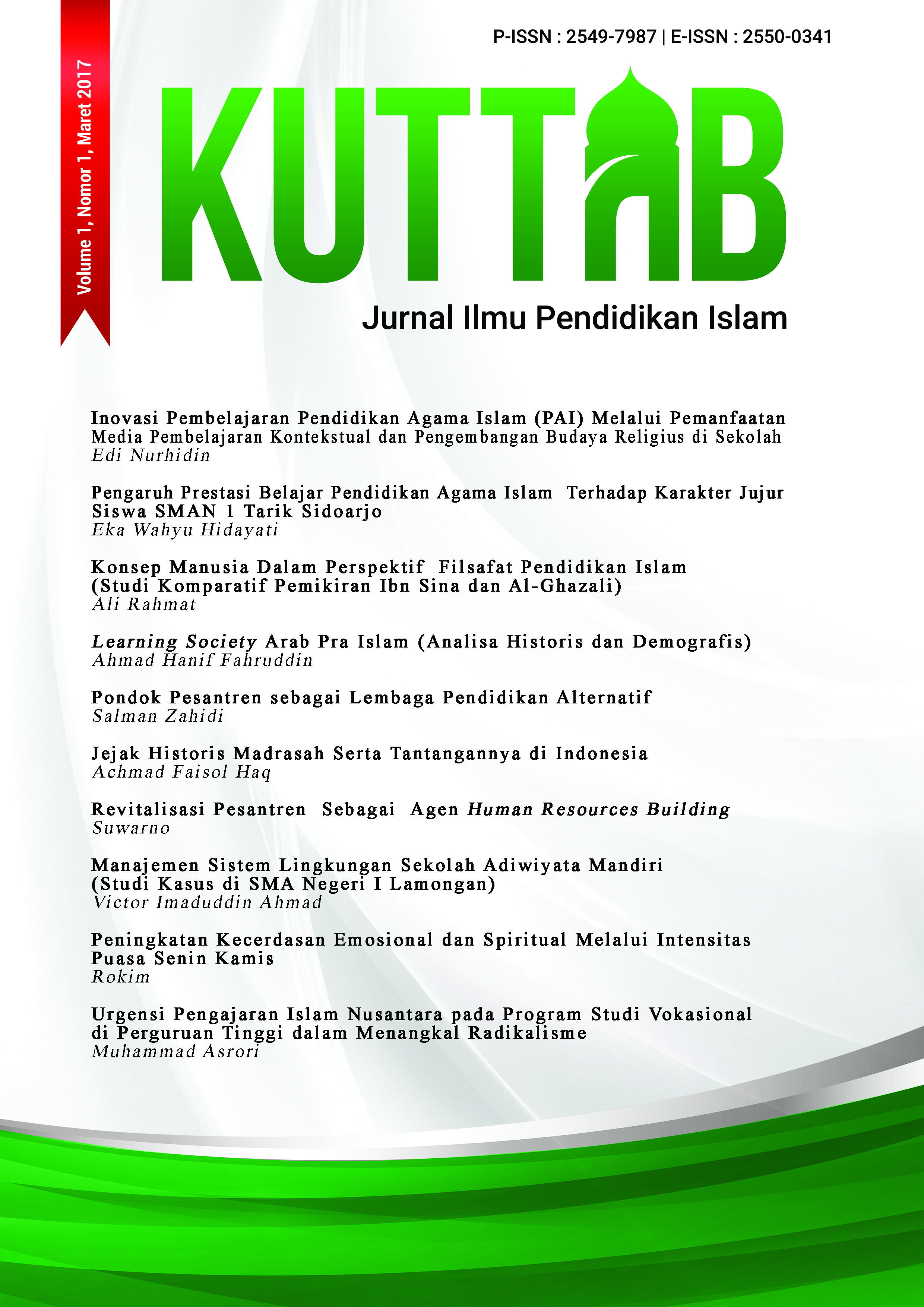PONDOK PESANTREN SEBAGAI LEMBAGA PENDIDIKAN ALTERNATIF
DOI:
https://doi.org/10.30736/ktb.v1i1.27Abstract
Ali Bin Abi Talib once said that children should be educated in accordance with the development of the times. The Ali bin Abi Talib’s statement could be considered as his attention more to the development of human civilization. For that reason, there should be studies focused on the role of educational institutions in facing the challenges of the times. On this stand, the writer raises the existence of pesantren (Islamic boarding schools) for being considered to have been able to survive amid the onslaught of civilization increasingly obscuring cultural identity. In addition, this study also aims to identify and discuss the role of pesantren in the modern era. This is a literature study using a descriptive and exploratory approach. It can be concluded that pesantren are non-formal Islamic educational institutions. Pesantren have permanent and distictive methods and learning models. The purpose of pesantren education is the same as Islamic education in general, instilling a sense of virtue, familiarizing themselves with courtesy, preparing for a holy, sincere and honest life entirely. Pesantren could be seen from three aspects: (a) pesantren that are seen from facilities and infrastructures, (b) pesantren that are seen from disciplines taught, and (c) pesantren that are seen from the fields of knowledge.
Keywords: Pesantren, education, cultural identity.Downloads
References
Abdullah, Irwan. Muhammad Zain & Hasse J (Eds). 2008. Agama, Pendidikan Islam dan Tanggung Jawab Sosial Pesantren. Yogyakarta: Sekolah Pascasarjana UGM bekerja sama dengan Pustaka Pelajar.
Arifin, M. 1995. Kapita Selekta Pendidikan (Islam Dan Umum). Yogyakarta: Rineka Cipta.
Anhari, Masjkur. 2006. Integrasi Sekolah ke dalam Sistem Pendidikan Pesantren (Tinjauan Filosofis dalam Perspektif Islam). Surabaya: Diantama.
Dhofier, Zamakhsari. 1994. Tradisi Pesantren: Studi tentang Pandangan Hidup Kyai. Jakarta:LP3ES.
Hakim, L. 2003. Pola Pembelajaran di Pesantren. Jakarta: Departemen Agama Ditpekanpontren Ditjen Kelembagaan Agama Islam.
Headari, Amin. dkk, 2006. Pesantren dan Madrasah Diniyah. Jakarta: Diva Pustaka.
Malik, Jamaludin. 2005. Pemberdayaan Pesantren. Yogyakarta: Pustaka Pesantren.
Mastuhu. (1994). Dinamika Sistem Pendidikan Pesantren. Jakarta: INIS.
Mulkhan, Abdul Munir. 2003. Pesantren Di Tengah Dinamika Bangsa. Yogyakarta: Qirtas.
Nadj, E.S. 1985. Perspektif Kepemimpinan dan Manajemen Pesantren, Pergulatan Dunia Pesantren: Membangun dari bawah. (Rahardjo, ed). Jakarta: P3M.
Nafi’, M.D. 2007. Praktis Pembelajaran Pesantren. Yogyakarta: Instite For Training and Development Amherst, MA Forum Pesantren dan Yayasan Selasih.
Zaeni, A.Wahid. 1995. Dunia Pemikiran Kaum Santri. Yogyakarta: LKPSM NU DIY.
Ziemek, M. 1986. Pesantren dalam Perubahan Sosial, diterjemahkan oleh Butche B.Soendjojo. Jakarta: P3M.















